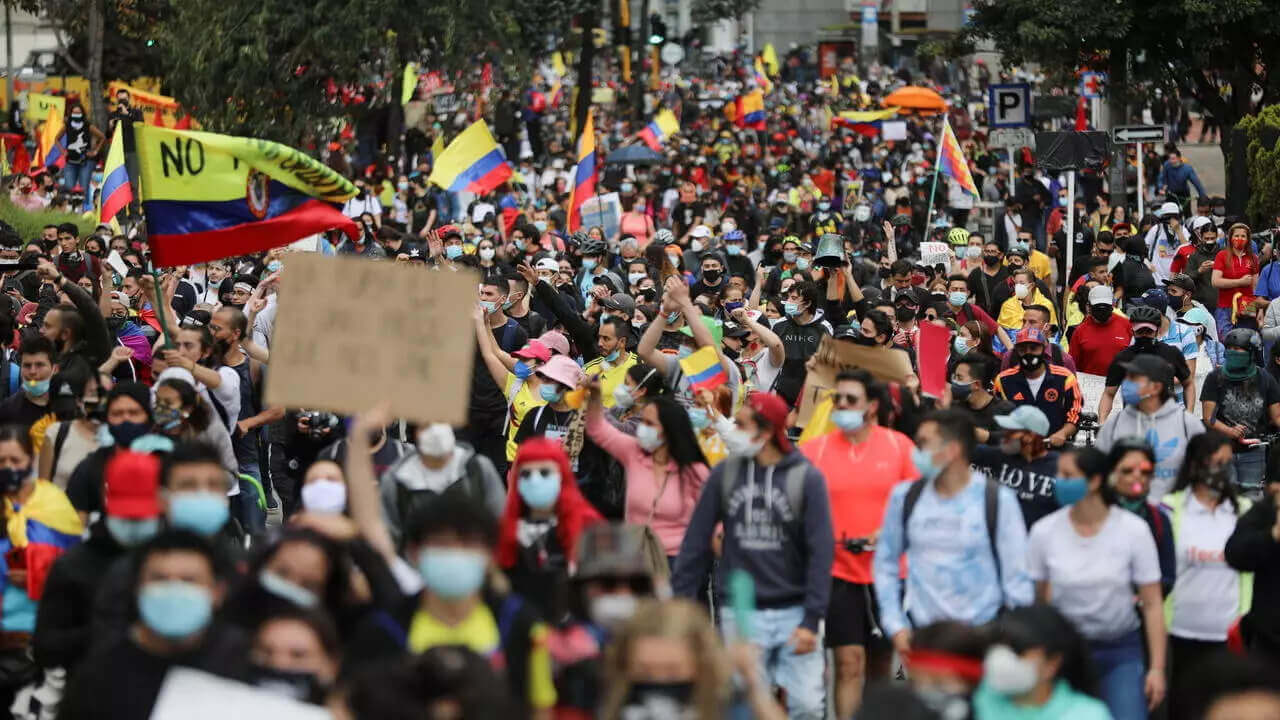Despite President Iván Duque withdrawing his decision to implement a controversial tax reform and Finance Minister Alberto Carrasquilla and Deputy Finance Minister Juan Alberto Londoño Martínez resigning, protests are still continuing across Colombia. At this stage, at least 21 people have been killed, more than 800 have been injured, and 503 have been arrested.
Last month, the ruling government proposed changes to Colombia’s tax system that would have raised taxes on citizens who make more than $656 a month and on several business owners. It also sought to increase value-added tax (VAT) on certain utilities and food products. Duque’s government said at the time that the reforms were needed to “stabilise Colombia’s finances, maintain its credit rating, and fund social programmes.”
The proposed reforms, though, drew widespread condemnation, with thousands of citizens taking to the streets across the country. This was hardly surprising, given that the country’s economy contracted by 6.8% in 2020; unemployment has also skyrocketed.
The intensity of the protests, many of which led to violent confrontations between protesters and security forces, forced Duque on Sunday to tell Congress to “withdraw the law proposed by the finance ministry and urgently process a new law that is the fruit of consensus, in order to avoid financial uncertainty.”
Alongside the resignations of the finance minister and his deputy, the team that worked to devise the plan for the reforms was also relieved of its duties.
Duque’s retraction drew celebration from both protesters and opposition politicians, such as leftist Senator Iván Cepeda, who said, “It is the youth, social organizations and mobilized citizens who have seen deaths and defeated the government,” adding, “May the government not present the same reform with make-up. The citizens won’t accept tricks.”
Aside from the tax reforms, the protests also drew attention to police brutality and the Duque administration’s political suppression. In fact, the president ordered the ‘militarisation’ of certain cities to calm tensions. He said on Saturday, “As Commander-in-Chief of the Armed Forces, the military assistance model will remain in force in urban centres where there is a high risk to the integrity of citizens and where the full capacity of the State is required to protect the population.”
The mayors of Bogotá, Medellín, and Calí, however, have rejected Duque’s attempts to further stifle criticism using the military. Calí Mayor Jorge Iván Ospina said, “Mr. President, the tax reform is dead. Don’t cause more deaths here.”
Duque, however, has been unmoved by criticism and has instead pointed the finger at the protesters, saying, “I would also like to issue a clear warning to those who by means of violence, vandalism and terrorism, seek to intimidate society and believe that through this mechanism they can subdue the institutions. We will not allow people taking the law in their own hands, the destruction of public and private property or the message of hatred to have a place in our country.”
In fact, popular discontent against excessive use of force by security forces is somewhat of a common theme in Colombia. In September last year, violent protests erupted following the death of a 46-year-old lawyer, Javier Ordóñez, in police custody. The ensuing protests left 13 civilians dead and hundreds injured. It is estimated that at least 400 human rights activists and community leaders have been assassinated since Duque came to power in August 2018.
Therefore, the latest protests against tax reforms have once again underscored the Duque administration’s aggressive measures to silence criticism, which perhaps explains why the protests have continued even after he withdrew the controversial tax reforms.
Deadly Protests in Colombia Continue Despite President Duque Withdrawing Tax Reforms
Last month, the ruling government proposed changes to Colombia’s tax system that would have raised taxes on citizens who make more than $656 a month and on several business owners.
May 4, 2021

IMAGE SOURCE: LUISA GONZALEZ / REUTERSThe mayors of Bogotá, Medellín, and Calí have rejected Duque’s attempts to stifle criticism using the military.
